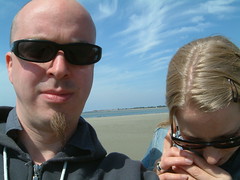 I really enjoyed the Extreme Pilgrim mini series on TV recently. I thought the first one was a little weak but the last two were really good.
I really enjoyed the Extreme Pilgrim mini series on TV recently. I thought the first one was a little weak but the last two were really good.I watched them out of order and ended up watching the second one last. Even though the last one was about the Jesus prayer and the life of an Orthodox hermit, it was the second programme I found most thought provoking.
In it Jones travelled to India and met a Sadhu or Holy Man. He then went to the Himalayas, to a village where he lived in a cave and was the de facto Holy Man for the village for a while.
It thew up lots of interesting questions but the one I have been left to chew over is the particular understanding of spiritual leadership that the Sadhu tradition offers.
His vocation was really to be an 'enlightened one' on behalf of the village - so, much of his time was spent in meditation and prayer, and the villagers supported him out of their meagre resources in order for him to do that. His presence was enough for them.
Much leadership in the church in the UK (and I guess I am talking particularly about the Anglican church now which is what I know best as it's my 'tribe') seems to me to be managerial and administrative in style. I am more and more convinced that what we actually need is more of a Holy Man/Woman approach.
But I am, however, a little conflicted on this as I was slightly troubled by the suggestion that the Sadhu (in Owen Jones' film) was doing/being something that the ordinary folk couldn't do/be. And that doesn't sit well with me either.
My friend Kath, who comes from a Tibetan Buddhist background and brings that flavour to her practice of Christianity (which I really enjoy and am fascinated and challenged by), talks about how important, in the Eastern tradition, devotion to a teacher is. And how we don't really get that in the West. I want to talk to her more about this. I am wondering what this means in terms of Christ being our teacher and also with what St John said in 1 John 2:
"As for you, the anointing you received from him remains in you, and you do not need anyone to teach you." (1 John 2:27).

No comments:
Post a Comment